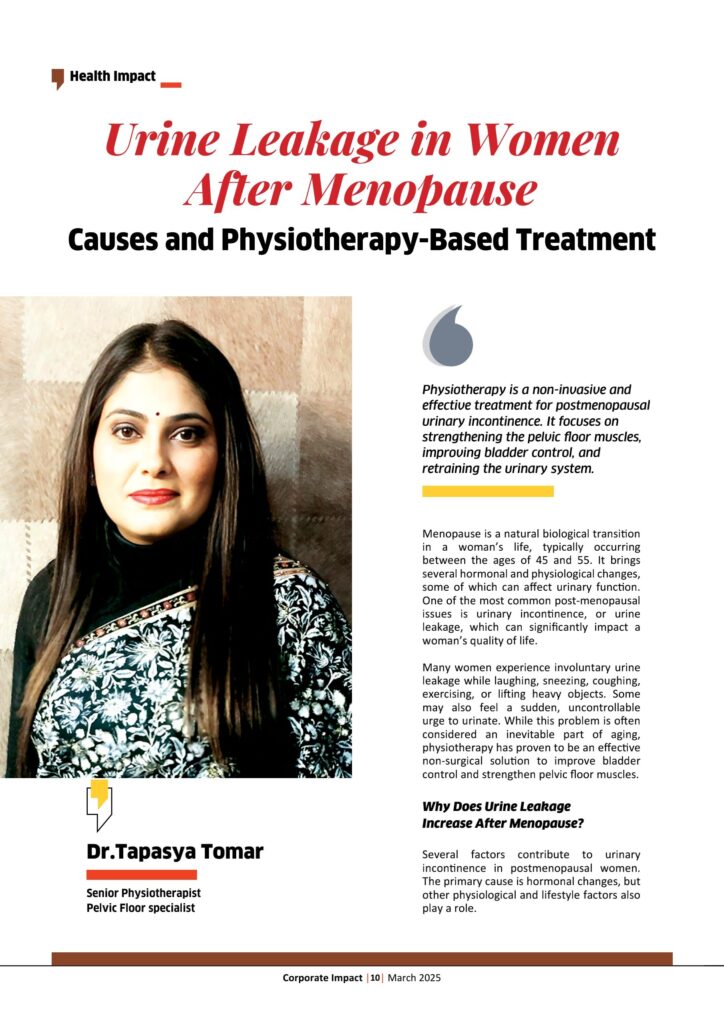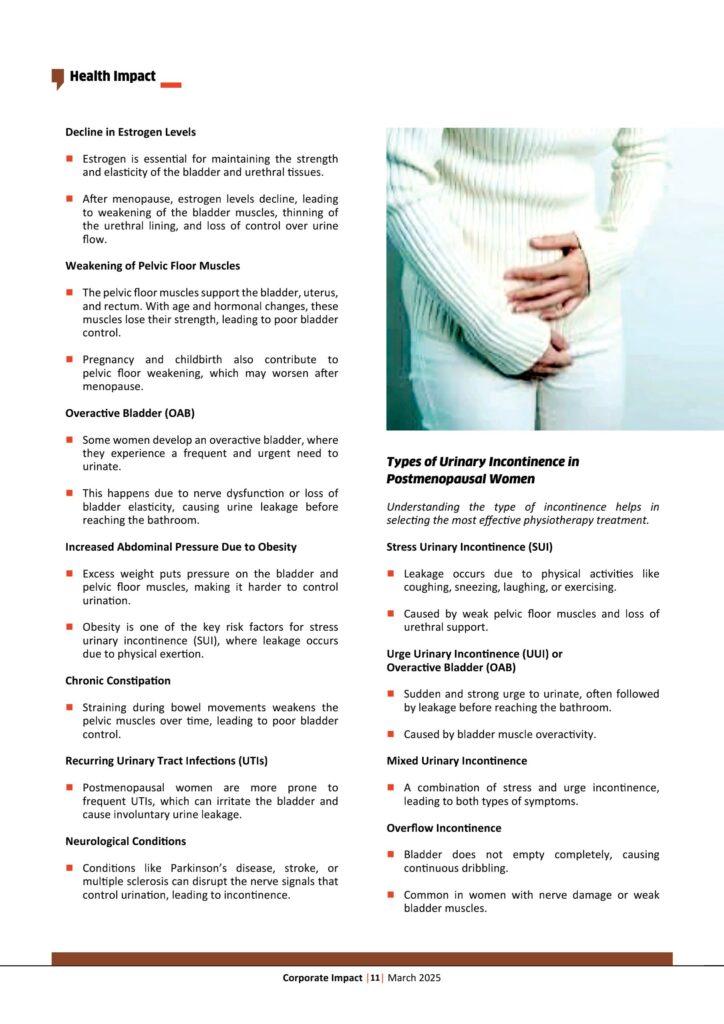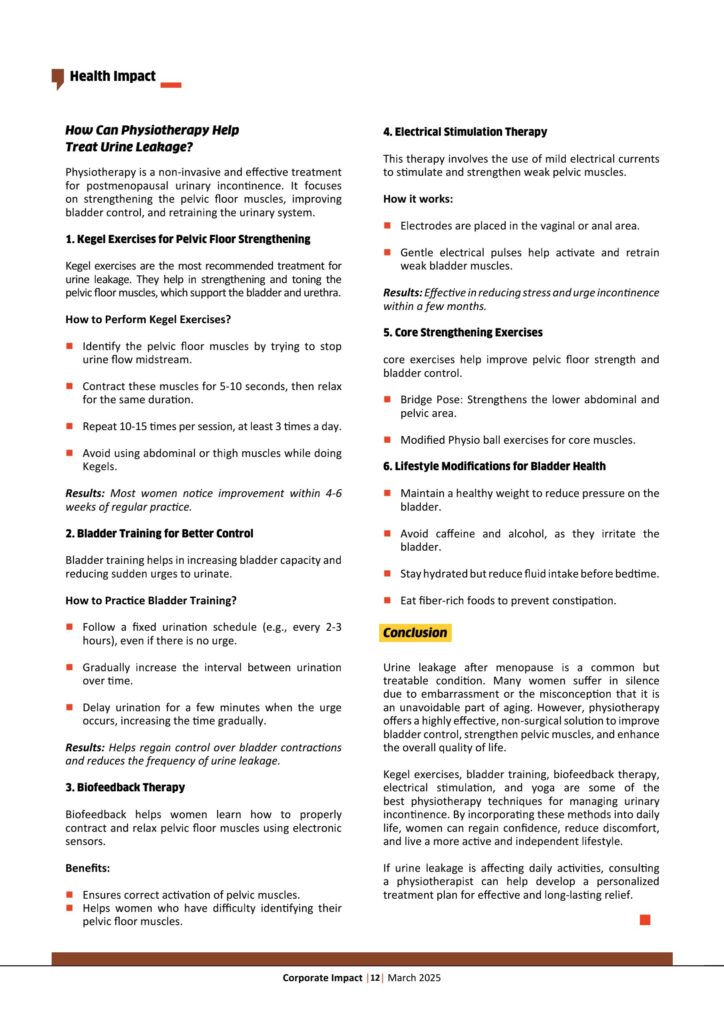Physiotherapy is a non-invasive and effective treatment for postmenopausal urinary incontinence. It focuses on strengthening the pelvic floor muscles, improving bladder control, and retraining the urinary system.
Dr.Tapasya Tomar
Senior Physiotherapist
Pelvic Floor specialist
Menopause is a natural biological transition in a woman’s life, typically occurring between the ages of 45 and 55. It brings several hormonal and physiological changes, some of which can affect urinary function. One of the most common post-menopausal issues is urinary incontinence, or urine leakage, which can significantly impact a woman’s quality of life.
Many women experience involuntary urine leakage while laughing, sneezing, coughing, exercising, or lifting heavy objects. Some may also feel a sudden, uncontrollable urge to urinate. While this problem is often considered an inevitable part of aging, physiotherapy has proven to be an effective non-surgical solution to improve bladder control and strengthen pelvic floor muscles.

Why Does Urine Leakage
Increase After Menopause?
Several factors contribute to urinary incontinence in postmenopausal women. The primary cause is hormonal changes, but other physiological and lifestyle factors also play a role.
Decline in Estrogen Levels
Estrogen is essential for maintaining the strength and elasticity of the bladder and urethral tissues.
After menopause, estrogen levels decline, leading to weakening of the bladder muscles, thinning of the urethral lining, and loss of control over urine flow.
Weakening of Pelvic Floor Muscles
The pelvic floor muscles support the bladder, uterus, and rectum. With age and hormonal changes, these muscles lose their strength, leading to poor bladder control.
Pregnancy and childbirth also contribute to pelvic floor weakening, which may worsen after menopause.
Overactive Bladder (OAB)
Some women develop an overactive bladder, where they experience a frequent and urgent need to urinate.
This happens due to nerve dysfunction or loss of bladder elasticity, causing urine leakage before reaching the bathroom.
Increased Abdominal Pressure Due to Obesity
Excess weight puts pressure on the bladder and pelvic floor muscles, making it harder to control urination.
Obesity is one of the key risk factors for stress urinary incontinence (SUI), where leakage occurs due to physical exertion.
Chronic Constipation
Straining during bowel movements weakens the pelvic muscles over time, leading to poor bladder control.
Recurring Urinary Tract Infections (UTIs)
Postmenopausal women are more prone to frequent UTIs, which can irritate the bladder and cause involuntary urine leakage.
Neurological Conditions
Conditions like Parkinson’s disease, stroke, or multiple sclerosis can disrupt the nerve signals that control urination, leading to incontinence.
Types of Urinary Incontinence in Postmenopausal Women
Understanding the type of incontinence helps in selecting the most effective physiotherapy treatment.

Stress Urinary Incontinence (SUI)
Leakage occurs due to physical activities like coughing, sneezing, laughing, or exercising.
Caused by weak pelvic floor muscles and loss of urethral support.
Urge Urinary Incontinence (UUI) or
Overactive Bladder (OAB)
Sudden and strong urge to urinate, often followed by leakage before reaching the bathroom.
Caused by bladder muscle overactivity.
Mixed Urinary Incontinence
A combination of stress and urge incontinence, leading to both types of symptoms.
Overflow Incontinence
Bladder does not empty completely, causing continuous dribbling.
Common in women with nerve damage or weak bladder muscles.
How Can Physiotherapy Help
Treat Urine Leakage?
Physiotherapy is a non-invasive and effective treatment for postmenopausal urinary incontinence. It focuses on strengthening the pelvic floor muscles, improving bladder control, and retraining the urinary system.
1. Kegel Exercises for Pelvic Floor Strengthening
Kegel exercises are the most recommended treatment for urine leakage. They help in strengthening and toning the pelvic floor muscles, which support the bladder and urethra.
How to Perform Kegel Exercises?
Identify the pelvic floor muscles by trying to stop urine flow midstream.
Contract these muscles for 5-10 seconds, then relax for the same duration.
Repeat 10-15 times per session, at least 3 times a day.
Avoid using abdominal or thigh muscles while doing Kegels.
Results: Most women notice improvement within 4-6 weeks of regular practice.
2. Bladder Training for Better Control
Bladder training helps in increasing bladder capacity and reducing sudden urges to urinate.
How to Practice Bladder Training?
Follow a fixed urination schedule (e.g., every 2-3 hours), even if there is no urge.
Gradually increase the interval between urination over time.
Delay urination for a few minutes when the urge occurs, increasing the time gradually.
Results: Helps regain control over bladder contractions and reduces the frequency of urine leakage.
3. Biofeedback Therapy
Biofeedback helps women learn how to properly contract and relax pelvic floor muscles using electronic sensors.
Benefits:
n Ensures correct activation of pelvic muscles.
n Helps women who have difficulty identifying their pelvic floor muscles.
4. Electrical Stimulation Therapy
This therapy involves the use of mild electrical currents to stimulate and strengthen weak pelvic muscles.
How it works:
Electrodes are placed in the vaginal or anal area.
Gentle electrical pulses help activate and retrain weak bladder muscles.
Results: Effective in reducing stress and urge incontinence within a few months.
5. Core Strengthening Exercises
core exercises help improve pelvic floor strength and bladder control.
Bridge Pose: Strengthens the lower abdominal and pelvic area.
Modified Physio ball exercises for core muscles.
6. Lifestyle Modifications for Bladder Health
Maintain a healthy weight to reduce pressure on the bladder.
Avoid caffeine and alcohol, as they irritate the bladder.
Stay hydrated but reduce fluid intake before bedtime.
Eat fiber-rich foods to prevent constipation.
Conclusion
Urine leakage after menopause is a common but treatable condition. Many women suffer in silence due to embarrassment or the misconception that it is an unavoidable part of aging. However, physiotherapy offers a highly effective, non-surgical solution to improve bladder control, strengthen pelvic muscles, and enhance the overall quality of life.
Kegel exercises, bladder training, biofeedback therapy, electrical stimulation, and yoga are some of the best physiotherapy techniques for managing urinary incontinence. By incorporating these methods into daily life, women can regain confidence, reduce discomfort, and live a more active and independent lifestyle.
If urine leakage is affecting daily activities, consulting a physiotherapist can help develop a personalized treatment plan for effective and long-lasting relief.















